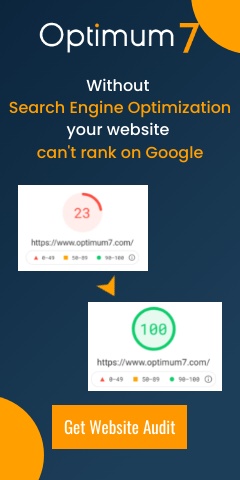Whenever you read a comment section about something related to Google, you’ll see countless SEMs complaining that Google’s hiding keywords or randomly ranking results to make SEO more difficult for smaller agencies, that they favor big brands and are trying to eliminate small agencies entirely.
The fact is that Google loves money — as we all do! Their first goal is to do the things that will make them more money; namely, be indispensable to the people that use their service.
The reason why big brands get more exposure than smaller companies in search results is because users favor bigger brands. Google monitors the behavior of its users and their data suggests that more of us engage with major brands more often, which is one of the main reasons why they get more visibility.
Competing With Big Brands Is Possible for Small Agencies
If you want to compete for keywords that bigger brands are also pursuing, you’ll have to work that much harder smarter to prove that you are more relevant and worth people’s time.
To do this, your team will need big, actionable ideas and detailed execution strategies. But creating these valuable things takes time. When you’re a small company with limited resources there may not be a whole lot of time to spare, but that time is exactly what you need to give yourself a competitive edge.
Efficiency is the key that will give you the time to create strategies that increase your exposure and sales. Since none of your clients are in the same industry, no two clients should be following the exact same strategy.
These days, efficiency is how you compete.
How SEO Has Changed — And What That Has to Do With Efficiency
“The Google Zoo” – Google’s algorithm updates (Pigeon, Panda, Penguin, Hummingbird, etc.), represent major change for the industry. With these updates, Google is pushing people and businesses to focus on the customer experience rather than profit. The focus has shifted from technical signals to human ones because real human interest is harder to fake. There’s an emphasis on eliminating, either by penalty or natural selection, the results that people aren’t interested in seeing.
Yet most marketers have spent their careers focused on the technical changes that increase rankings without really considering whether they were providing value to the end user. So while Google’s goal is to improve results for the people that use their services, there’s this big push away from what marketers are familiar with on a technical level, which can be disruptive and frustrating.
Even with all the evidence that times have changed, many small marketing companies are still clinging to the same old tactics that worked well for them in the past…regardless of how their futility now.
It’s not about creating links with a few multi-tasking “marketers” or “buying and reselling” articles that have been made to look like an in-depth article by writers with no authority and no purpose beyond the money.
It is about CREATING smart marketing strategies and professional articles with authority, written by experts that are grammatically pristine and targeted to a well-researched audience, who then search, seek further information, share and engage in discussion online through their social networks of choice.
When a person reads an article and engages with it (by sharing it on social media or commenting on it), does more research on the topic or references it in something that they’re writing, Google’s algorithm notices. It’s this human behavior, these human “signals” that ultimately matter to Google.
But if you want to write the kinds of articles that get attention, or do something that others believe is worth writing about, you need time. Time to develop the idea, come up with a plan, execute it, review the results and tweak it to perform even better. Taking the time to write one really well thought out, in-depth article full of new information is going to perform better than 20 mediocre articles — even if they take the same amount of time to create.
Google does NOT care if you have a keyword repeated twenty times throughout your site. What matters to Google is that you have twenty people “engaging” with content about a “keyword” such as an article or product page. See the difference?
Working Hard Isn’t Always Working Smart: Focus on the Right Things
SEO is a science. It operates according to mathematical laws that are statistically reliable and predictive of human behavior. But it can’t establish business goals, tell convincing stories or understand why a particular person buys a particular product — that all falls under the umbrella of marketing.
No matter how hard a reluctant-to-change company works, they’ll never get worthwhile results because they’re not spending their time on the things that really make a difference. If they can’t transition to the new way marketing is done there is a very real chance that they will cease to exist, which may be why some commenters feel like Google’s pushing them out of the industry.
Marketing companies that provide SEO services must ultimately choose what kind of company they’re going to be. Will they work to make clients happy for a finite amount of time? Or will they work smart and become more efficient, using that time to do work that establishes long-term client relationships and gives them a competitive edge?
[bctt tweet=”Is employee efficiency affecting your ability to compete in search? “]
Time Is Money
Whatever requires your company’s time also requires money. You must consider what you’re spending your time on and whether that time (and therefore money) is worthwhile to your business objectives.
When you have a small team that’s expected to execute every part of a marketing strategy, SEO becomes much harder. There are 1,000s of small details that must be checked daily, but when your marketing team is juggling multiple tasks (some of which aren’t even related to SEO), they might not have time to focus on their specialty and how they can make their processes more efficient, which will free up time to do even better work.
When your team is struggling to get the work done, they might not have time to devote to the activities that are going to grow your business and make you more competitive. This industry is constantly changing and if you don’t make time to adapt your processes and your thinking to these new changes, you’ll find that it gets harder and harder just to keep up.
Small businesses have to be twice as smart about resources. By definition, you’re going to have smaller budgets and a smaller team, which translates into fewer people doing a lot more work. The work that gets done should be deliberate, related to a larger objective and have a justifiable impact.
So what steps can you take to become more efficient?
- Divide the Labor: Outsource vs In-House
In the late 18th century, Adam Smith was developing his theory of labor division. As he tested different ideas, he realized that dividing labor made an organization more efficient because each segment was able to specialize in a certain area and concentrate on developing and improving that specialty.
The Digital Marketing industry is enormous and covers a lot of territory:
- Search Engine Optimization (SEO)
- Pay-per-click management (PPC)
- Online public relations (PR)
- Content marketing
- Brand journalism
- Email marketing
- Mobile marketing
- Networking
- Social marketing
- Web design
- Custom programming
They say no man is an island, but no business is completely self-sufficient either. There’s no way a small business on a limited budget will be able to provide every one of these services and deliver quality. So the first step in becoming more efficient is admitting that there’s work you simply won’t be able to handle, for whatever reason.
People don’t love a company that does everything. That’s how it used to be 20 years ago, but not now. Not anymore! They love a company that does one or two things; but does them exceptionally well. Choose what you’re going to specialize in. This is the work you’ll do in-house. If you want to offer services outside of your specialty, you’ll have to consider outsourcing the work to a company that specializes in that service. Just make sure you’re choosing a partner for the quality of their work — not their cost or your personal relationship with them.
Apple didn’t start building microprocessors. They let IBM build microprocessors because IBM used to do it best and more efficiently. By not focusing on those details Apple had the time to develop their own product with that amazing design; which is their specialty.
- Create a Process
Each employee’s role and every company’s process should be clearly defined and work together as a cohesive unit. A process chain allows you to segment your business, which ultimately gives you more control over the quality of work coming from each department. (Remember, you can’t manage what you can’t control.)
When you’re able to clearly identify each part of your production process and employ people who specialize in that area, you’ll be able to evaluate each step of the process and decide whether it can be improved or eliminated. You’ll also be in a better position to predict the cost, duration and quality of a project before you provide a quote, which means greater efficiency because projects will run on-schedule and you can plan around the work you have to do.
If you run a factory, this means you’ll have the time and capacity to focus on high volume production. But marketing companies aren’t factories. They rely on the human mind for ideas and strategies and execution.
There’s always an erroneous tendency to believe, even when business is booming, that you can always get more from your team. This belief actually kills employee utilization, affects the quality of what you send to existing clients and burns the team out.
More time doesn’t mean you take on additional projects. It means you’re reducing your employees’ workload so they can do more for their existing clients while having the time to develop ideas and do the creative work that’s going to keep you competitive and at the forefront of the industry.
The creation process is an essential part of SEO and marketing. It’s what gives you an advantage over your competitors. While they’re working at breakneck speed to just do the bare minimum, you have the time to focus on the quality of your work, the precision of your executions and testing your solutions for optimal performance. You also have more time to share your knowledge and position yourself as a thought leader within the industry.
Ultimately, your clients don’t care how many projects you handle at any given time. “They can do more” is not a priority for them. To them, you only have one project — theirs. And they want you to do a quality job for the lowest possible cost.
When you’re efficient, you can reduce your costs because things take less time to do and improve your quality of service because you have more time to focus on doing it well.
The client has a tangible benefit and can see your improvement. As time passes they’ll see that they’re receiving a better quality service for less and that you’re growing as a company, which is an unshakeable foundation for a long-lasting, happy client relationship. It’s these kinds of relationships that will make you a lot harder to compete with.
- Balance Your Team
Small businesses don’t have the luxury of “teaching” up-and-coming marketers without already having a functional, productive and happy team in place that can be relied on to do the work and get results.
An efficient team isn’t made up of rookies. It’s not made up of all 5-star guys either. An effective team balances a hierarchy of roles within the department. Experts, specialists and entry-level employees all play an important role within the company:
- SEO experts focus on creating smart marketing strategies based on their in-depth understanding of the marketing industry and their client’s industry
- Marketing specialists execute the strategies while refining their understanding of the industry
- Entry-level marketers should be learning everything the specialists can teach them and paying attention to where the experts are going. When they have enough knowledge, they can start executing the strategies and training a new crop of marketers while the specialists become experts in their own right and start creating strategies of their own.
Only a real expert can develop a strategy that competes with what a big brand is doing. If you’re only hiring people who are new to the industry, you’re not going to be able to compete the way you need and want to.
And while surveys on salaries for marketing professionals may lead you to believe that you can hire an expert for $30,000 a year, the reality is that a professional willing to take that salary won’t have the knowledge or experience to take your team where it needs to go.
Many expert marketers making under $40,000 in the US are either incompetent or underpaid. If you hire the former, you’ll see poor results. If you underpay, the results will be short-lived or interrupted when that person finds another company willing to pay them what they’re worth.
While a true expert will cost you a bit more out of pocket, the money will be worth it from day one because you’ll be introducing someone to the company that can create the strategies and lead the team into competitive positions alongside industry giants. However, financially, everything has to add up and make sense.
Whether or not you choose to pay the people who can do the job depends on which kind of company you want to be — one who takes on short contracts or one who establishes long-term client relationships. You’ll only get a long-term relationship by investing in the time and tools it takes to build one.
Yet a real expert isn’t one just because they say so in their resume. This person must live and breathe their expertise. They know how to do great market research, competitive research and get meaningful results for clients. They’re constantly reading industry publications and are aware of the latest techniques and changes. They make time to develop real solutions and improve company processes because they’re passionate about what they do and want to do it well. They enjoy sharing their knowledge and willingly join debates with other companies because it keeps them on their toes. They’re still involved with their accounts after they’ve punched out because they genuinely care.
And because they do this, your company will have real staying power within the industry. You’ll build a solid foundation of strong client relationships and adapt to future industry changes easily because your team will already be aware of what’s happening and know how to use it to your clients’ benefit.
To Compete With Big Brands, You Must Remember That You Aren’t One
Efficiency is the only viable way for a small marketing agency to compete with a big brand. You don’t have the same manpower or budget, but when you open up time for your employees to do quality work and explore their passion, they’ll start creating things and taking your business to heights you only dreamed of.
What do you think of efficiency as a competitive edge? Share your thoughts in the comments and tell me what steps you’re taking to make your agency more efficient.





